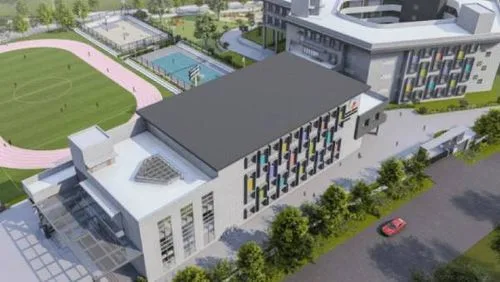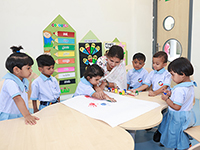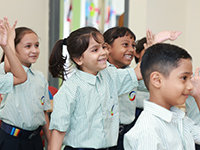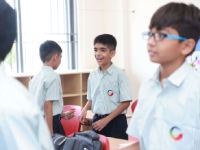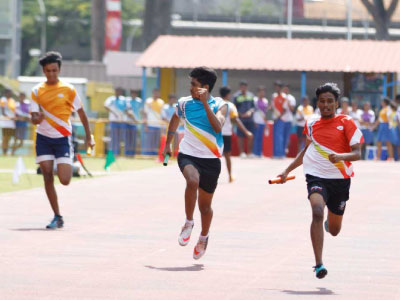Download our FREE Academic Calendar now! 📚 Start your child’s journey to success.
The GIIS Early Years Curriculum
A deep dive into the curriculum framework
The curriculum framework is built around seven learning areas:
• Language and Literacy
• Numeracy
• Science and Technology
• Social Studies
• Arts and Crafts
• Physical Education
• Personal, Social, and Emotional Development
• The Primary Years Programme (PYP) of the International Baccalaureate (IB) and the Early Years Foundation Stage (EYFS) framework of the UK
• The Australian Curriculum
The curriculum’s conformity to international best practices
The GIIS Early Years Curriculum emphasises:
• Play-based learning: Hands-on activities and play are used to develop critical thinking, problem-solving, and creativity.
• Inquiry-based learning: Children are encouraged to explore, investigate, and discover concepts.
• Differentiated instruction: Teachers tailor their teaching to meet the diverse needs of learners.
• Assessment for learning: Ongoing assessments inform instruction and support student progress.
The GIIS Early Years Curriculum creates a lifetime love of learning and lays a solid basis for future success by balancing academics, play, and social development.
Holistic Development at GIIS
At GIIS, holistic development is at the core of our early years of education. Children’s physical, cognitive, emotional, social, and creative development are interconnected and essential for their overall growth.
Importance of physical development in early years
Early physical development is critical because it establishes the groundwork for future health and wellbeing. Our programs include:
• Age-appropriate physical activities
• Outdoor play
• Fine and gross motor skills developmentBy integrating these aspects, we provide a comprehensive education beyond academics, fostering our students’ intellectual, emotional, physical, and social growth.
Fostering cognitive development through engaging activities
• Hands-on experiments
• Problem-solving games
• Storytelling and reading
These activities stimulate curiosity, critical thinking, and creativity.
Cultivating emotional intelligence and social skills
• Role-playing
• Group activities
• Empathy-building exercises
These help children develop self-awareness, self-regulation, and harmonious relationships.
Nurturing creativity and imagination
• Arts and crafts
• Music and movement
• Imaginative play
Focusing on holistic development gives children a strong foundation for lifelong learning, social success, and emotional wellbeing.
The Role of Play in Early Learning
Play-based learning promotes children’s creativity, critical thinking, and problem-solving abilities by letting.
them explore, discover, and learn via practical experiences.
The significance of play-based learning
• Encourages active learning
• Develops social and emotional skills
• Enhances cognitive development
• Builds confidence and self-esteem
How GIIS incorporates play into the curriculum
• Themed play areas
• Hands-on activities
• Outdoor play
Benefits of unstructured play for child development
• Promoting self-directed learning
• Encouraging imagination and creativity
• Developing social skills through peer interaction
• Enhancing physical development through movement and exploration
By incorporating play into the curriculum, GIIS provides a well-rounded education that prepares children for future success while fostering a love for learning. Unstructured play, in particular, allows children to develop essential life skills, making them more confident, creative, and resilient individuals.
Creating a Stimulating Learning Environment
Importance of a child-centric classroom
• Encourages active learning
• Develops social and emotional skills
• Builds confidence and self-esteem
• Supports individualised learning
The function of teachers in the education of young children
• Well-designed classrooms with play-based learning areas
• Low teacher-to-student ratios, ensuring individual attention
• Trained teachers who understand child development
• Emphasis on social-emotional learning and character development
• Maintaining open lines of contact with parents while fostering collaborationIn addition to supporting children’s holistic development, GIIS provides a secure, caring, and stimulating environment that establishes the groundwork for future academic success and lifetime learning.
How GIIS creates a safe and nurturing environment
GIIS achieves this through:
• Well-designed classrooms with play-based learning areas
• Low teacher-to-student ratios, ensuring individual attention
• Trained teachers who understand child development
• Emphasis on social-emotional learning and character development
• Maintaining open lines of contact with parents while fostering collaboration
In addition to supporting children’s holistic development, GIIS provides a secure, caring, and stimulating environment that establishes the groundwork for future academic success and lifetime learning.
Partnership with Parents
The importance of parent involvement
• Enhances academic performance
• Develops social and emotional skills
• Encourages open communication
• Fosters a sense of community
How GIIS supports parents in their child’s development
• Regular progress updates and parent-teacher conferences
• Workshops and training sessions on child development and parenting
• Volunteer opportunities in the classroom and school events
• Access to resources and guidance from teachers and counsellors
Building strong parent-school relationships
• Encouraging open communication and feedback
• Fostering a sense of belonging and community
• Providing opportunities for parent involvement and participation
• Demonstrating a commitment to collaborative learning and developmentBy partnering with parents, GIIS creates a supportive and inclusive environment that benefits children’s development and wellbeing.
Assessing and Monitoring Child Progress
Assessment methods used at GIIS
• Observations of children’s play and learning
• Teacher-led assessments and evaluations
• Standardised tests and quizzes
• Project-based assessments
• Portfolios of children’s work
Regular Parent-Teacher Interactions
• Regular parent-teacher conferences
• Progress reports and updates
• Workshops and information sessions
• An open-door policy that lets parents express their concerns
Transition to Primary School
• Preparing children academically and socially
• Providing orientation programs for parents and children
• Collaborating with primary school teachers to ensure continuity
• Giving guidance and support throughout the transition
By regularly assessing and monitoring child progress, GIIS ensures that each child receives the support and guidance they need to succeed academically and personally.
Conclusion
To sum up, GIIS Playschool in Nagpur offers a comprehensive and holistic approach to early childhood education. Our child-centric curriculum, experienced teachers, and state-of-the-art facilities provide a nurturing environment for children to grow and develop. Playschool is a crucial stage in a child’s life, and we are committed to making it a positive and enriching experience.
At GIIS Playschool in Nagpur, we foster a love for learning, creativity, and exploration. Our playschool program is designed to prepare children for future academic success and lifelong learning. We cordially invite you to join our learning community and discover the GIIS distinction.
If you are looking for a play school in Nagpur that offers a world-class education, look no further than GIIS. Schedule a campus tour today and discover how we can help your child thrive.















